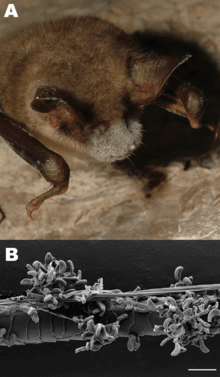Pseudeurotiaceae
The Pseudeurotiaceae are a family of fungi in the division Ascomycota.[1] This family can not yet be taxonomically classified in any of the ascomycetous classes and orders with any degree of certainty (incertae sedis).[2]
| Pseudeurotiaceae | |
|---|---|
 | |
| A) Greater mouse-eared bat (Myotis myotis) with white fungal growth. B) Scanning electron micrograph of a bat hair colonized by Pseudogymnoascus destructans. Scale bar=10 μm | |
| Scientific classification | |
| Kingdom: | |
| Division: | |
| Class: | |
| Order: | |
| Family: | Pseudeurotiaceae Malloch & Cain (1970) |
| Type genus | |
| Pseudeurotium J.F.H.Beyma (1937) | |
| Genera | |
|
Connersia | |
General characteristics
The general characteristics for members within this family include hyaline or brown ascospores, within a thin-walled ascus inside a cleistothecial ascomata.[3]
gollark: Also, it makes a bunch of assumptions others may not be happy with.
gollark: <@!137565402501742592> You should *probably* not use it now, as it isn't very robust, lacks all the features in the second/third lists, and is utterly without support.
gollark: Oh. Right. That.
gollark: When did I *ever* imply it was nice to use?
gollark: beeite.
References
- Malloch D, Cain RF (1970). "Five new genera in the new family Pseudeurotiaceae". Canadian Journal of Botany. 48 (10): 1815–25. doi:10.1139/b70-267.
- Lumbsch TH, Huhndorf SM (December 2007). "Outline of Ascomycota – 2007". Myconet. 13: 1–58.
- Cannon PF, Kirk PM (2007). Fungal families of the world. CAB International. p. 299. ISBN 9780851998275.
This article is issued from Wikipedia. The text is licensed under Creative Commons - Attribution - Sharealike. Additional terms may apply for the media files.